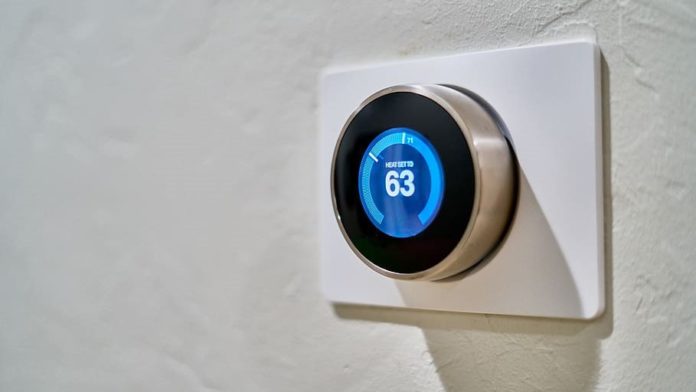Space heating and cooling are among the largest consumers of energy in the home, accounting for around 40% of total use. Many people believed programmable thermostats would be a game-changer for homeowners, as they were designed to help save money through finer control of energy use throughout the day.
However, creating a dynamic program that takes advantage of these benefits is difficult for the average homeowner to do, and this can have mixed results with programs that may end up consuming even more energy than before.
ecobee is a cleantech company that aims to change that by introducing AI-based technology to help homeowners optimize their energy use.
They designed the first smart thermostat back in 2008, and continue to innovate with the release of their ecobee SmartThermostat range in June 2019. The company claims that their highly customizable and intelligent thermostats can save customers up to 23% on home energy costs.
Stuart Lombard, ecobee‘s founder and CEO, was inspired to start the company after returning from a vacation to a freezing cold house in Toronto back in 2007. Disappointed in the performance of his programmable thermostat, he aimed to create a product that strikes the balance between conserving energy without compromising on comfort.
Today, ecobee claims to have saved enough energy with their products to take Las Vegas off the grid for a whole year (~10.4 TWh). That equates to a reduction of around 7.3 million tonnes of CO2.
ecobee was one of 12 Canadian companies listed in the 2020 Global Cleantech 100, an annual roster for the world’s best cleantech companies.
Why AI-based thermostats have an edge
Programmable thermostats often come with cost reduction claims of between 10-30%, but this has been contradicted by research that suggests it may only be 6.8% on average. One paper even found that homeowners actually end up using 12% more energy with programmable thermostats.
This is often put down to inefficient use by the owners, who tend to use less energy when away or sleeping, but an excessive amount when at home. Large swings in temperatures and inconsistent use raise the home’s total energy use over time.
Energystar reports that many owners may be unable or unwilling to deploy custom programs on their units that maximize the savings potential. Others point to common myths that encourage inefficiencies, like cranking the temperature really high in a cold home to heat it ‘faster’ or leaving it up even when not at home under the belief that it’s cheaper to have a constant temperature.
Smart thermostats have an edge because they do the thinking for us and are more dynamic. They learn from their user’s behaviour and automatically adjust, allow them to change the climate in their house remotely, and display energy consumption and costs in real time. These features ultimately help users optimize energy use to a finer degree than programmable thermostats, which translates to lower bills.
The ecobee SmartThermostat
The ecobee SmartThermostat comes with a range of customizable features that can be controlled by voice thanks to advanced machine learning and AI for speech pattern recognition. It can also be controlled from a smartphone and integrates with leading software like Amazon Alexa, Google Assistant, and SmartThings.
Using the ‘Comfort Settings’ feature, customers can set different schedules depending on activity. The standard three comfort settings include home, sleep, and away, but new categories can be made by the user.
The ‘Smart Away’ mode utilizes remote occupancy sensors to adjust the temperature if nobody is around, and the ‘Follow Me’ mode allows selective control over the thermostat based on where people are in the home.
Additional features include the ‘Vacation Mode’ for a set temperature when everyone is away, an alert system for extremes of humidity or temperature, and reminders for household maintenance like filter replacements.
“We see the smart home emerging as an oasis where great technology can fade into the background and free you from the chaos of everyday life,” commented Lombard in a press release.
“We’ve designed the new ecobee SmartThermostat with voice control to be the foundation of that vision.”
ecobee’s product line goes beyond the SmartThermostat. They are also invested in home security through their Haven and SmartCamera product lines. These devices can work in harmony with one another to monitor customers’ homes and offer peace of mind when away for extended periods.
Privacy concerns and COVID cutbacks
As always with smart tech, the elephant in the room concerns privacy and customer data. The devices collect environmental, operational HVAC (heating, cooling and ventilation systems), and occupational sensing data to personalize user experience and maximize efficiency.
ecobee have emphasized that they are committed to safeguarding personal data and do not sell it on to third parties. Customers also reserve the right to be forgotten whenever they wish.
So far, 2020 has been a difficult year for businesses, and ecobee is no exception. In late March, they announced a 10% layoff along with a launch postponement for the SmartLight. Lombard himself took a 30% pay cut as part of these moves.
In an interview with Betakit, he noted that the move was simply one of protection for the company’s viability: “Though we would hope to escape the economic effects of COVID-19 we also understand that hope is not a strategy,” he said.
“So, we really feel like we needed to act to preserve the long term viability and value of the business that we’ve created.”








































